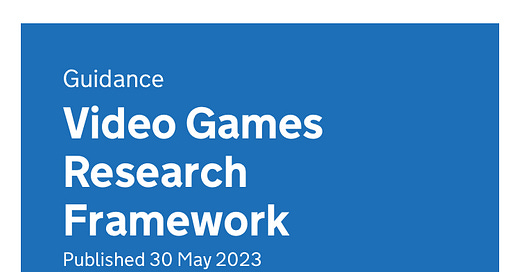UK Video Games Research Framework
This Framework is provided as a best-practice supporting tool for research into video games to help our understanding on how video games have impacted individuals, consumers, communities, industries and societies, and to support researchers to deliver shared research objectives.
Foreword by Professor Tom Rodden, Chief Scientific Advisor to the Department for Culture, Media and Sport
Video games are an important part of our daily lives, and of the UK’s social and cultural fabric. The games sector sits at the intersection between the creative and technology sectors, and has pioneered innovation and new tech that has created spillover benefits in industries such as film, TV and fashion. The games industry supports the UK’s economic growth, contributing an estimated £2.8 billion (GVA) to the UK economy in 2019, and fosters new skills in its players and workforce that will be important in growing both the digital and creative economies of the future.
Video games research spans many disciplines and fields, making this an exciting area that continues to develop with a growing research community. Research in this space engages a broad set of disciplines from computer science, social science, education and health to interactive entertainment law and culture and the creative arts; providing opportunities for multidisciplinary and interdisciplinary approaches across these spaces.
As Chief Scientific Adviser, my role is to ensure government policy is informed by the best possible evidence, which is what this Video Games Research Framework aims to facilitate. The Department for Culture, Media and Sport (DCMS) has worked collaboratively with the UK Research and Innovation (UKRI) Research Councils, other government departments, academia, and industry, both within and outside of the UK, to develop this Framework.
The Framework aims to facilitate and promote high quality research on video games, underpinned by the principles of inclusivity, openness, transparency and independence. It does so in 3 main areas:
to develop a shared understanding of research priorities, topics and questions, and setting out shared priorities with Research Councils and their funding streams
to promote and share best practice in methodologies, research standards and open science; and
to highlight how ethical data capture and data sharing practices can support improved research
Developing the Framework has helped build a new community of academics around video games from across disciplines, and has helped to forge new links between academia and industry. Through extensive collaboration with these groups, we have fostered ongoing engagement between them to support future high quality research into video games.




